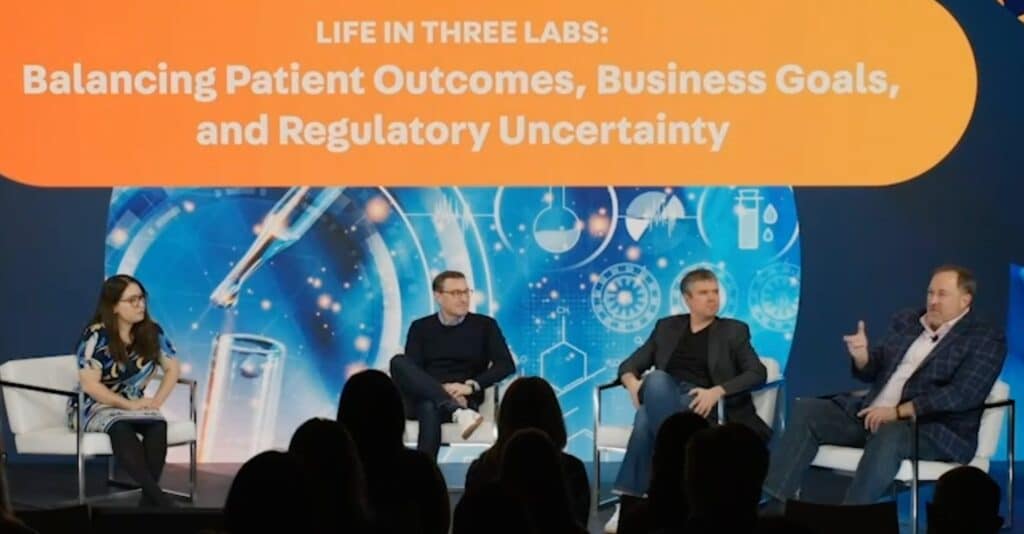This year’s AdLab Health Marketing Summit culminated in a panel discussion about women in the health marketing industry, the challenges they’ve met, and opportunities for men and women alike to be there for their colleagues. “Redefining Leadership: Empowering Women in Health, Advertising, and Technology” was moderated by DeepIntent Chief Revenue Officer Lisa Kopp Johnson and featured leaders passionate about improving the experiences of our industry’s people.
Meredith Carber, Associate Director of Media Planning and Execution at Sanofi; Kristy Quagliariello, VP of Programmatic Media at Klick; and Melissa Gordon-Ring, Global President of Health at Initiative covered a lot. From the role of mentors and allies to tips for starting cultural shifts, their insights can help women and men navigate the path to leadership. They also shared what they’ve learned about fostering inclusive environments—empowering every person to reach their potential and contribute to work that matters.
Finding and being mentors
Quagliariello told the audience about her biggest champions in her career, noting, “Sometimes, allies and mentors can be in the form of someone of a different gender or someone that’s not working in our industry.”
Gordon-Ring agreed and described what has made people good mentors and allies for her. “I think it’s really important to have a sounding board of people who understand you for who you are. Not necessarily who you think you are, or who you want to be, but who you actually are—and they can have realistic conversations about your strengths and your weaknesses.”
What if you’d like to have a mentor, but you’re struggling to find the right one? “Even if it’s not organic or natural to pursue these relationships,” urged Carber, “it really is so important to identify, in your organization, employee resource groups, affinity groups, people who have different roles, different functions, different perspectives, people who can become those allies for you.” And once you do make those connections? “I think the last piece is you have to nurture those relationships.”
Sometimes, the right mentor may come from an unexpected place. “I think the more seasoned that you become, it’s great to talk to people who don’t necessarily work in media or advertising. Diversity of thought, I think, is so helpful,” said Gordon-Ring. And regardless of where they’re coming from, “true mentorship” is “when you’re in the thick of it and you need help or support or a solution—someone who’s going to be committed to actually being there.”
Shifting organizational culture
Kopp Johnson acknowledged that it’s one thing to ensure your actions help lift up others, but it can be a steeper challenge to have your actions “cascade down within your organizations.” Our panelists shared how they help achieve just that.
“At one of my first agencies, my client at the time wouldn’t let anyone below a director level in the room” for critical discussions, said Carber. “But a lot of those individuals who are in more junior positions—they’re the ones who are doing the day-to-day and leading the charge on emerging technology.” Therefore, it can be pivotal to promote visibility by “making sure that those women who are in more junior-level positions really feel like they’re being heard.”
To that same end, Quagliariello shared some quick and easy tips. For example, “copying the team on emails and making sure they have a higher perspective.” Quagliariello also noted that she meets with every new hire one-on-one because “developing that personal connection with them is really important. I think it’s really about leading by example and ensuring that you’re creating this inclusive, approachable environment.”
Gordon-Ring stressed the value of acknowledging—daily—the work of women and others at your organization. In our industry, it’s impactful to acknowledge more specifically “that their work is contributing to something important for the greater good and for those around them—they might not even realize that’s happening.”
Achieving progress
Carber described a scenario that resonated with many in the audience. “There are times where you might say something, and it’s overlooked or glossed over, and then a few minutes later, somebody else who happens to be male says the exact same thing. And it’s now Bible.”
With that in mind, Quagliariello said, “I think whatever we can do to try to help people own what they’ve said is important. How do we just do our best to pull out as much of that person as possible in a way that makes them feel comfortable? I think that’s a place that we could actually do a lot more.”
Quagliariello related another familiar scenario, saying that, as a woman, you might get “invited to the conversation for female representation. And I think when you get that opportunity, at first, you might kind of think it’s a little bit offensive, [but] it’s really important to take that opportunity and be there. Let the men in the room and everyone know, this is why I’m here. It’s not just because I’m a woman—it’s because I have expertise. I have something to contribute. And I think that it’s really important to take advantage of those opportunities that might at first seem a little offensive. Remember who you are and be grateful for the journey.”
Gordon-Ring shared a formative experience from an earlier role on her journey. “I had a leader that was just like, ‘I trust you. I trust you. I’m here to give you what you need, but I trust you.’ That was so freeing.”
Advice for parents
As mothers and professionals, panelists shared what they work to impart to their children. In addition, they highlighted what, as daughters, they learned from their parents that best promoted their success.
Carber shared, “My dad never said I couldn’t do anything. He doesn’t really get what I do now,” she joked, “but ultimately, he established very simple principles: how to manage my finances, how to be confident in who I am.”
Quagliariello noted that her father “[led] by example. I saw how hard he worked, but he never pushed my sister and me into anything. He kind of just let us do what we wanted to do and whatever our interests were.”
“I want to show my daughter that it is okay to be a strong leader,” said Gordon-Ring. “It is okay to not be a mommy all the time, and that’s really tough. I try to find those teachable moments whenever I can.”
Her final piece of advice? “Say ‘yes’ more. Say ‘yes’ to things that are new and different and make you uncomfortable. It changes your perspective, and you just might like it. But it’s also okay to say ‘no.’ Especially as women, we have a very hard time saying ‘no,’ but it’s okay to be deliberate about it and own it and don’t give an excuse.”
Carber added, “I think sometimes I can say, ‘I’m too busy to go to that ERG meeting’ or ‘I’m too tired after a long day of work to go to a volunteering or networking event.’ I think we all can catch ourselves. Don’t be complacent. Make sure you actively engage with your community and make time for those things that are impactful. Not just for yourself—it’s ultimately also going to help your organization.”
Want to see what else we covered at AdLab? Click here for our top insights.


